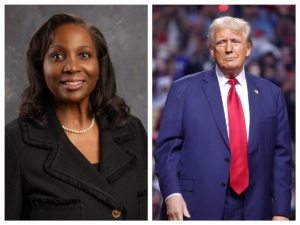Confusion has deepened over the fate of 14 immigrants deported by the United States to Ghana earlier this month, with several deportees insisting they remain in custody despite official claims to the contrary.
According to statements made to the Associated Press, at least 11 of the group are still confined at the Bundase military camp near Accra under what they described as “terrible” conditions. Those being held include four Nigerians, three Togolese, two Malians, and one each from Gambia and Liberia.
Lawyers for the detainees confirmed that the group has taken the Ghanaian government to court, arguing that their detention violates both human rights and Ghana’s own laws. Court filings show that the deportees are demanding immediate release and protection from being sent back to their countries. Eight of them say they are entitled to legal safeguards against deportation because of the risk of “torture, persecution or inhumane treatment.”
READ ALSO: Ghana denies holding U.S.-deported migrants as lawyers allege abuse and secret detention
The deportees, who were sent from the U.S. on September 6, said they had spent between seven months and a year in American detention, with some even winning their immigration cases before being expelled. “They said nothing. Nobody said anything about why they are deporting me or where they were sending me,” said a 28-year-old Togolese man. Another Nigerian deportee, who had lived in the U.S. for 12 years, described worsening health in custody, adding, “Some of us are getting sick and have malaria due to bad water and bad food.”
At least one of the deportees has reportedly returned to Gambia, while two others are believed to have been sent to Nigeria, according to court declarations.
These accounts directly contradict Ghana’s presidential spokesperson, Felix Kwakye Ofosu, who earlier told AP that all 14 had been returned to their respective countries. The government previously maintained that all but one of the deportees were Nigerian.
Attorneys in the U.S. argue the Trump administration’s decision to deport the group to Ghana was a way to sidestep legal protections preventing their return to countries where their safety could be at risk. A U.S. judge acknowledged those protections but said her “hands are tied” once the migrants were outside U.S. jurisdiction.
READ ALSO: Judge demands Trump administration explain deportation tactics involving Ghana
Meredyth Yoon, a lawyer representing four of the detainees, warned that her clients’ lives could be in danger. “They are afraid that the reason the Ghanaian government is insisting that they are not in the country is because they are afraid something will happen to them,” she said.
The deportation program has drawn massive criticism from human rights groups, who say international protections for asylum seekers are being ignored.
Both U.S. Immigration and Customs Enforcement and the Department of Homeland Security declined to comment on the matter when contacted Wednesday, according to AP.










